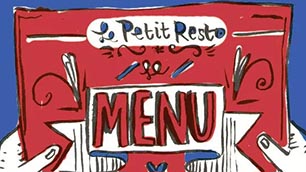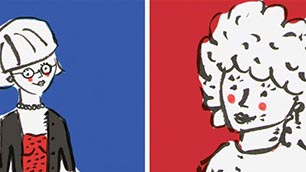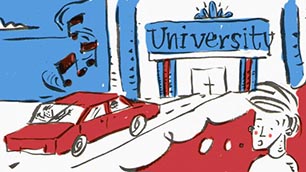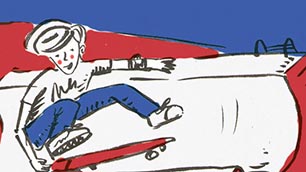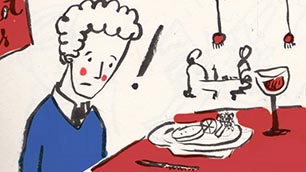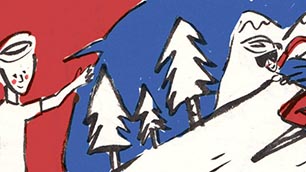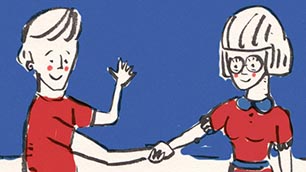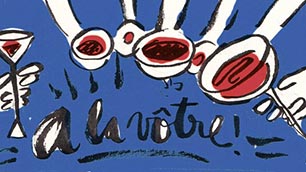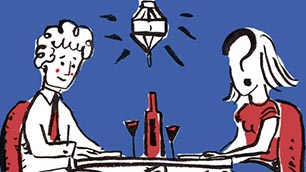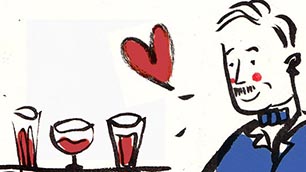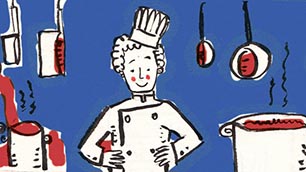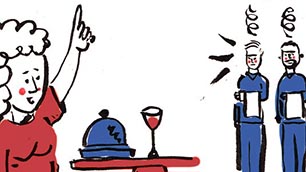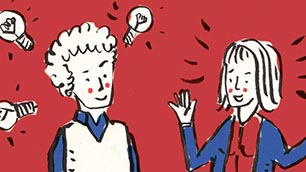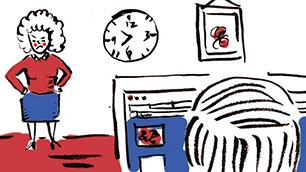| Valérie: | As we’ve seen in our lesson, aller is an important irregular verb. It’s not irregular in all the tenses but it is in the present. I’m having you learn the key irregular verbs first on purpose. The regular will then seem to be a piece of cake. |
| Michelle: | A piece of pie à la mode even! |
| Valérie: | You’re funny! |
| Michelle: | J’ai faim, that's why I’m obsessing about food. J’aime parler de food. But j’aime beaucoup your strategy, do the harder stuff first. |
| Valérie: | Vous avez faim Michelle ? |
| Michelle: | Oui, un peu. |
| Valérie: | Vous avez soif ? |
| Michelle: | Oui, oh that makes me think, I have something to drink. |
| Valérie: | Allez-y. |
| Michelle: | Allez-y ? |
| Valérie: | It means ‘go ahead,’ you remember? |
| Michelle: | Oui, oui. |
| Valérie: | Un soda ? |
| Michelle: | That’s how you say soda in French, un soda. |
| Valérie: | Are you allowed to drink sodas during your cleanse? |
| Michelle: | It’s ok, it’s a diet soda! |
| Valérie: | But it has caffeine. |
| Michelle: | It will boost my mental powers for the rest of the lesson. |
| Valérie: | D’accord. Allons-y. |
| Michelle: | Allons-y ! Oh, by the way, il y a des diet sodas en France ? |
| Valérie: | Oui, nous avons des diet sodas. In fact, we say soda light instead of diet soda. |
| Michelle: | These are the tips I need from you! I will sound really French when ordering un soda light au café. Serveur, un soda s’il vous plaît ! |
| Valérie: | Parfait. Let’s cover all the different uses of aller. It means ‘to go.’ What else is it used for ? |
| Michelle: | For saying how you are doing. |
| Valérie: | In English, you use ‘to be’ to express how you are. How are you? I’m well, I’m fine. |
| Michelle: | I never thought about that! |
| Valérie: | But in French, we use ‘to go.’ |
| Michelle: | So it’s not ‘how are you?’ but it’s ‘how do you go?’ |
| Valérie: | Exactement. |
| Michelle: | I go well, or I’m going well. Funny! |
| Valérie: | Demandez-moi, ask me how I am. |
| Michelle: | Comment vas-tu ? |
| Valérie: | Don’t forget to use ‘vous’ when you address me. |
| Michelle: | Pardon. Comment allez-vous ? |
| Valérie: | Je vais bien, merci Michelle. Et vous, comment allez-vous aujourd’hui? |
| Michelle: | Aujourd’hui ? |
| Valérie: | It means today. |
| Michelle: | Ok, aujourd’hui, je vais bien, merci. |
| Valérie: | Où allez-vous ? |
| Michelle: | Je vais... au restaurant. I wish. Non, non, je vais à la maison. |
| Valérie: | Bien Michelle. You notice a simple way to make a question, by inverting the subject and the verb. |
| Michelle: | Just like in English. |
| Valérie: | Oui. The other use of aller is the near future. Instead of ‘I will’ in English, you can say ‘I’m going to.’ In French, you conjugate ‘aller’ in the present and you add an infinitive after. Je vais étudier le français. Let’s practice a bit of that. |
| Michelle: | OK. Hhmm, let's see...after my cleanse, je vais aller au restaurant. Je vais manger une apple pie à la mode. |
| Valérie: | Bien. Let’s use verbs we already know. |
| Michelle: | Je vais habiter en France. Il va étudier le français. |
| Valérie: | Il ? Your husband ? |
| Michelle: | Oui. Nous allons chercher une maison en France. Nous allons trouver une maison aux Champs-Élysées. Nous allons aller au café. Je vais aller à la boulangerie où il y a des low fat croissants. Il va aimer la France. |
| Valérie: | C’est très bien Michelle. Nice sentences. |
| Michelle: | Merci, je vais parler français ! Je vais, tu vas, il va, elle va, nous allons, vous allez, ils vont, elles vont ... en France ! |




